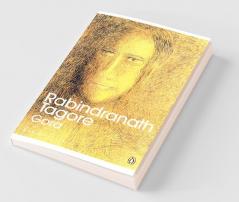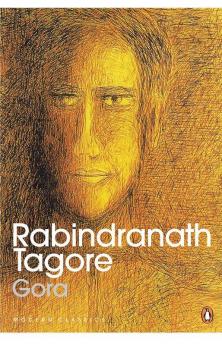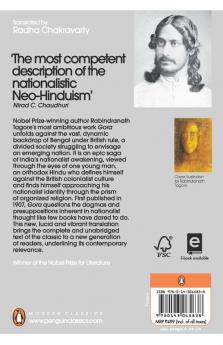English
Paperback
₹353
₹550
35.82% OFF
(All inclusive*)
Delivery Options
Please enter pincode to check delivery time.
*COD & Shipping Charges may apply on certain items.
Review final details at checkout.
Looking to place a bulk order? SUBMIT DETAILS
About The Book
Description
Author
Nobel Prize-winning author Rabindranath Tagore’s most ambitious work Gora unfolds against the vast dynamic backdrop of Bengal under British rule a divided society struggling to envisage an emerging nation. It is an epic saga of India’s nationalist awakening viewed through the eyes of one young man an orthodox Hindu who defines himself against the British colonialist culture and finds himself approaching his nationalist identity through the prism of organized religion. First published in 1907 Gora questions the dogmas and presuppositions inherent in nationalist thought like few books have dared to do. This new lucid and vibrant translation brings the complete and unabridged text of the classic to a new generation of readers underlining its contemporary relevance. Review A masterpiece of Tagore a great spirit of India. Through the conflict between orthodox Hinduism and Brahmo Samaj this books shows us what the true faith is and what the true religion is. About translation. Since I can't read Indian language I don't know how well this translation preserves the beauty of the original. But one is clear that this translation is readable. One thing that this books lacks this book provides no annotations at all. Expressions like ""param brahmani jojitachittah"" appear. The author may have preserved the original text so that its delicate meaning would not be distorted but this makes some sentences not understandable.. --By Baek Sosung on February 13 2014Although the title is very old the values it teaches are still applicable today. Translation has preserved the Indian cultural background. Excellent story which shows how social barriers can be overcome by maturity love and tolerance. --By Amazon Customer on September 26 2012I had heard of Tagore over the years but had no real idea what a great human being he was. The Indian references were difficult for me but I really got the idea that he understands the human condition the politics freedom hope love family and the rest of it. I wish we had one of these people around today. --By Benedict on October 6 2014 About the Author Rabindranath Tagore (1861-1941) was the youngest son of Debendranath Tagore a leader of the Brahmo Samaj which was a new religious sect in nineteenth-century Bengal and which attempted a revival of the ultimate monistic basis of Hinduism as laid down in the Upanishads. He was educated at home and although at seventeen he was sent to England for formal schooling he did not finish his studies there. In his mature years in addition to his many-sided literary activities he managed the family estates a project which brought him into close touch with common humanity and increased his interest in social reforms. He also started an experimental school at Shantiniketan where he tried his Upanishadic ideals of education. From time to time he participated in the Indian nationalist movement though in his own non-sentimental and visionary way and Gandhi the political father of modern India was his devoted friend. Tagore was knighted by the ruling British Government in 1915 but within a few years he resigned the honour as a protest against British policies in India. Tagore had early success as a writer in his native Bengal. With his translations of some of his poems he became rapidly known in the West. In fact his fame attained a luminous height taking him across continents on lecture tours and tours of friendship. For the world he became the voice of India's spiritual heritage and for India especially for Bengal he became a great living institution. Although Tagore wrote successfully in all literary genres he was first of all a poet. Among his fifty and odd volumes of poetry are Manasi (1890) [The Ideal One] Sonar Tari (1894) [The Golden Boat] Gitanjali (1910) [Song Offerings] Gitimalya (1914) [Wreath of Songs] and Balaka (1916) [The Flight of Cranes]. The English renderings of his po
Delivery Options
Please enter pincode to check delivery time.
*COD & Shipping Charges may apply on certain items.
Review final details at checkout.
Details
ISBN 13
9780143065838
Publication Date
-02-11-2022
Pages
-544
Weight
-375 grams
Dimensions
-129x198x32.424 mm
Imprint
-Penguin Random House India Pvt.Ltd.














